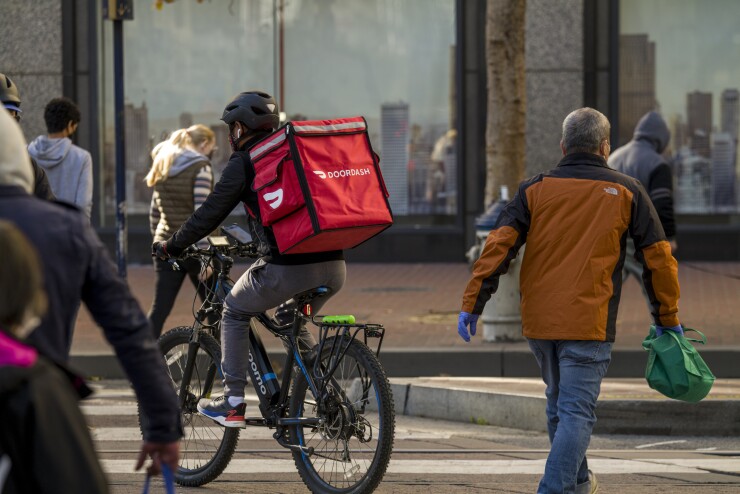
Uber Technologies and Lyft can keep classifying California drivers as independent contractors, after the state's top court said a company-backed law passed by voters doesn't wrongly curtail the legislature's power over worker protections.
The unanimous ruling upholding California's Proposition 22 was released Thursday.
The favorable ruling for the gig economy companies removes what investors regarded as a major regulatory overhang. Had the judge ruled to invalidate Prop 22, the companies would have faced the threat of millions of dollars in additional cost to pay drivers if they were to be reclassified as employees, upending their business models and potentially raising user costs in one of their biggest US markets.
Shares of Uber, Lyft, DoorDash and Instacart all spiked on the news. Lyft saw the biggest gain, with a 7.4% jump in share price.
Justice Goodwin H. Liu in May oral arguments said the law doesn't necessarily preclude workers from ever receiving workers' compensation, a system to help workers injured on the job that the state legislature has constitutional power to oversee. The case was brought specifically over the constitutionality of this provision, but Liu said the law doesn't block legislators from deciding that independent contractors are eligible for workers' compensation.
California's constitution doesn't bar voters from passing legislative initiatives on matters impacting workers' compensation, Liu wrote Thursday.
Read more:
"It would unduly restrict the initiative power to give the Legislature what would essentially be a first-mover advantage, precluding the electorate from undoing any action the Legislature takes pursuant to" the workers' compensation system, Liu wrote.
The ruling is a win for the industry as gig companies like Uber, Lyft, and DoorDash poured more than $200 million into their 2020 campaign to preserve the core of their business models and keep drivers classified as independent contractors.
Meanwhile, drivers and unions argued that the law improperly shifts the cost of doing business onto gig workers and denies them other protections, such as minimum wage, sick leave, and overtime pay.
Passenger app drivers make a median wage of about $5.97 per hour without tips in California when factoring all work time, gas, and vehicle weathering, according to a May University of California at Berkeley
Read more:
It's not the first time this term the California Supreme Court has weighed in on the extent of California's uniquely expansive right for voters to pass new laws and amend existing ones.
The state top court in June blocked a ballot measure that would have asked voters to make new state and local taxes harder to enact. The measure would have revised the state constitution, which is beyond the power of voters, the opinion said.
The court ruling affirms "the will of the nearly 10 million Californians who voted to deliver historic benefits and protections to drivers, while protecting their independence," Uber said in a statement.
"Whether drivers or couriers choose to earn just a few hours a week or more, their freedom to work when and how they want is now firmly etched into California law, putting an end to misguided attempts to force them into an employment model that they overwhelmingly do not want."
Liz Jarvis-Shean, DoorDash's vice president of communications and policy said in a statement, "This decision is a huge victory for California Dashers and voters – Prop 22 is here to stay."





